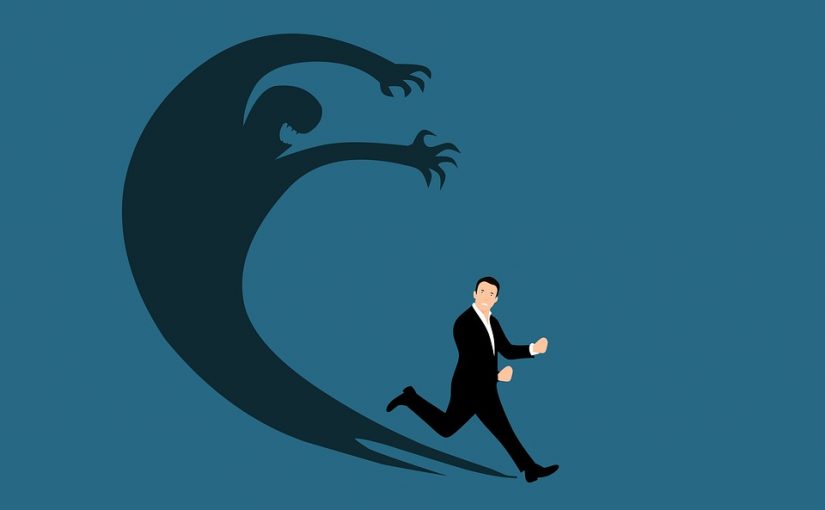It may be that by joining in with a lecture or seminar, whether in person or online, or even just the thought of doing this, you feel “out of control”. These feelings may lead you to leave these situations, or you may be avoiding teaching altogether.
So if seminars or lectures feel too much, and you’ve been avoiding university as a result, this is the section for you. In it, I’m going to focus on the process of giving a presentation as an example of something that might feel overwhelming, but you can use the guidance here for any kind of situation that evokes similar feelings in you.
What is anxiety?
It’s really important to remember that the experience of anxiety is a normal reaction to perceived danger. It can be thought of as our “stress response” or “fight or flight”.
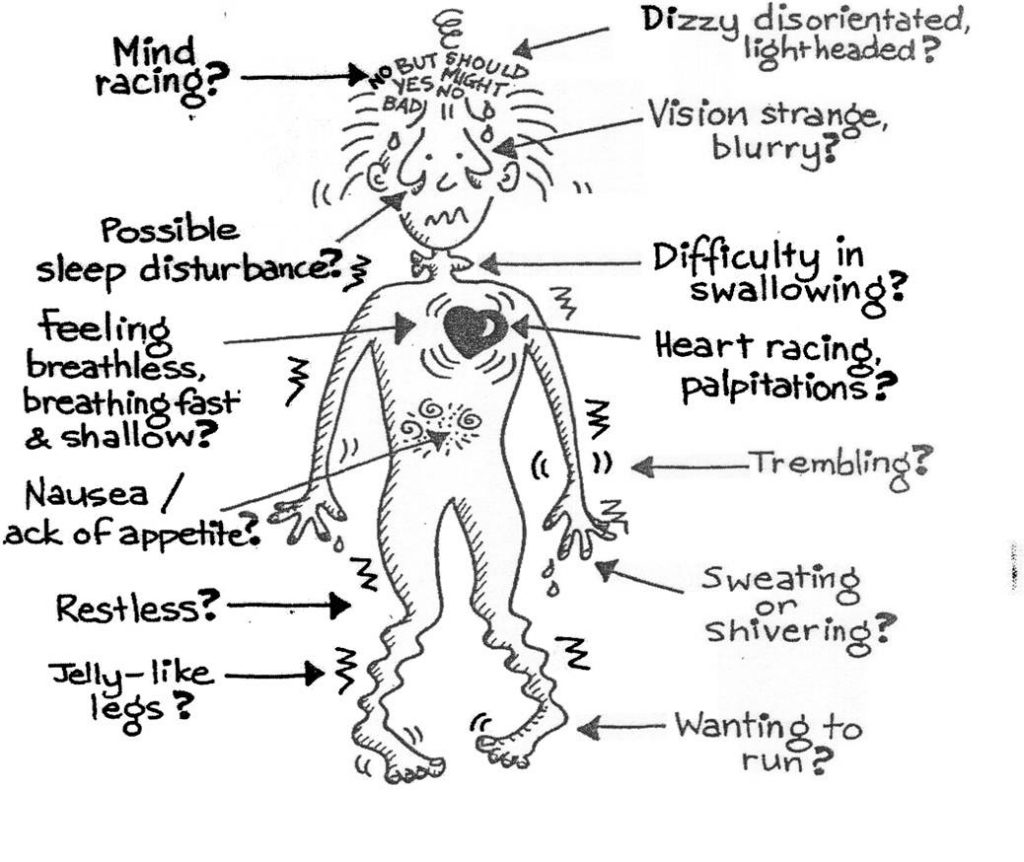
Fight or flight is a primitive response designed to protect us from physical harm. It is triggered by a sense of threat, which thousands of years ago was obvious, but now, not so much. Our bodies and brains have not caught up with the modern world. Although physical danger is rare, our bodies still react in the same way to what we perceive as threatening, and what we perceive as threatening could be anything.
Performance anxiety.
Most of us feel anxious speaking in front of an audience, for example when having a job interview, or giving a speech. But sometimes this kind of anxiety can become more of a problem, and it can get in the way of us doing the things we want to do. This can be especially true at university, when you have to give presentations, speak in front of a class or take part in group exercises. If this is the case, you probably experience the “fight or flight” response at these times and feel thoroughly miserable about it.
In this instance the “threat” we are perceiving is a thought, and our automatic response is to escape. Examples of avoidance include:
- Not taking part in lectures or seminars – both online and in person,
- Staying quiet and not answering or asking questions,
- Giving the presentation, but letting other members of your team talk more, or trying to stay in the background.
- Avoiding eye contact with anyone in the audience, and
- Leaving quickly or early.
The cycle of anxiety.

This mixture of thoughts, physical feelings, behaviours, and emotions can become a cycle that maintains our anxious feelings, so that every time we are faced with having to perform, we experience the same thing.
This can prevent us from doing things that may be important for us, prevent us from learning and mean that we may not be able to reach our potential.
So, how do we break the cycle? By focusing on each of the elements in it.
Breaking the cycle.
Put your thoughts on trial.
Thoughts are not facts, yet it is all too easy to believe the negative ones. Try to look at your fear from a balanced perspective. Ask yourself, “What am I thinking is going to happen?” and then put these thoughts on trial by asking:
- Is this thought fact or opinion?
- Is this thought helpful to me?
- Does this thought inspire me, or is it very important, right now?
- Do I really need to believe and act on this thought?
- Is this thought kind to me or others?

If you answer no to any of these questions, try and dismiss that thought. Ask yourself these questions instead:
- What is absolutely true about this situation?
- What would be helpful to think right now?
- What is really important to think or do right now?
- What is necessary to do right now?
- What would be a kind thought, right now?
Challenge avoidance behaviour.
Every time we avoid something, we are confirming our thoughts that it is something dangerous. Therefore, every time we are confronted with this situation, we feel just as anxious, or worse, even more anxious than before. We never get the chance to challenge the anxiety and find out if it really is as scary as we fear.
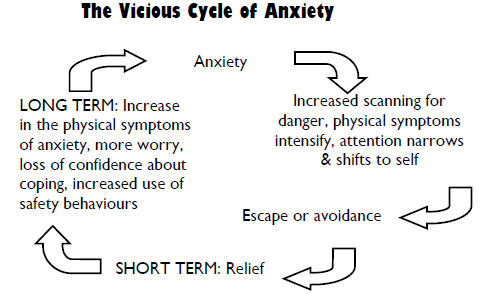
When you’re reversing this cycle, and starting to do the things you have been avoiding, life gets better. It may seem scary, challenging or altogether too hard at first, but it really does work. And, the trick is to do this in a manageable way. Not diving straight in at the deep end, but gradually working up to it.
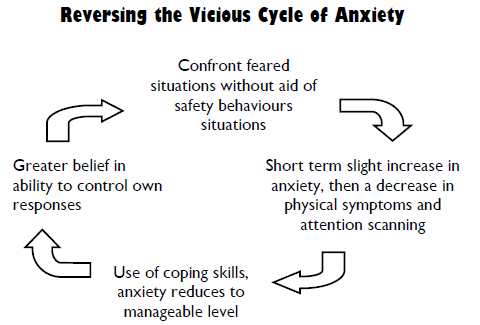
How do we do this?
Sketch out a staircase of avoided/feared situations, with the least scary at the bottom. Start with your smallest fears and work your way up. The idea is to repeat what is on each step of the staircase approximately 4 times, to allow your anxiety to reduce by 50% each time. Once you have done this, you can move up to the next step.
So, as an example, Step 1 might be identifying the topic you are going to present. Step 2 might be going to a seminar and watching other people give presentations. Step 3 might be videoing yourself presenting, and playing it back. Be as creative as possible with the steps, and ask for help with the list. It also helps to find someone you can report back to about your progress.
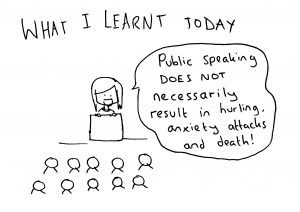
Manage physical symptoms.
While you are working on thoughts and behaviours, it really helps to learn a few techniques to reduce the toll that the physical effects of anxiety can have on you. If you are generally feeling on-edge, then it won’t take much for anxious feelings to be spiked to a level that feels overwhelming.
Use relaxation/meditation exercises – for example deep breathing or progressive muscle relaxation (you can find information by googling these techniques). There are many Apps out there that you can use for this too. Recommendations include: Calm, My Life, and Headspace. We also have a weekly mindfulness meditation drop-in. Do it twice a day, every day and you should notice your anxiety reduce!
This is a useful technique to reduce self-focus that can be done anywhere, including in exam halls, seminar groups, or in your own room:
- Pay attention and mentally label and describe things in the room you are in: your surroundings, other people, the sights and sounds.
- Use the 5, 4, 3, 2, 1 technique if you feel overwhelmed:
- Name 5 things you can see in the room with you.
- Name 4 things you can feel (“chair on my back” or “feet on floor”)
- Name 3 things you can hear right now (“fingers tapping on keyboard”)
- Name 2 things you can smell
- Name 1 good thing about yourself
- Look at others – notice that you are not the central focus of everyone’s attention.
- Moving your focus away from your body also moves you from the physical symptoms of anxiety, and they become less likely to affect you.

More help.
This is a really big subject, and its been a real challenge to squeeze everything onto one web page. If you struggle with this, or would like additional support, you can refer yourself to the University Medical Centre Psychological Therapies team: 01227 469338.
Additional material for this web page was also provided by the UMCPT team, for which I am very grateful.
